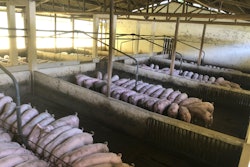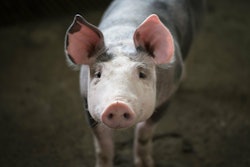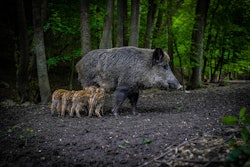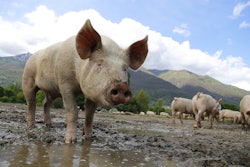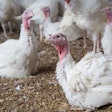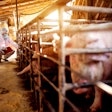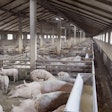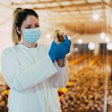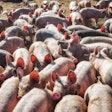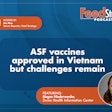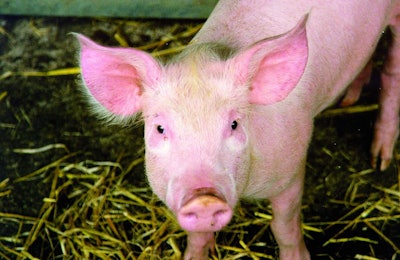
Scientists from Germany and Scotland report on a key scientific development that may help in the future control of African swine fever (ASF).
In the meantime, the virus continues to spread rapidly in the Balkan states, mainly among backyard herds of domestic pigs. Total outbreaks in this population in Europe have already passed 2,000 so far this year, while that for wild boar stands at more than 5,900.
Currently, there is no internationally approved treatment for or vaccination against ASF in pigs.
However, scientific understanding of the disease has taken a significant step forward as the result of international collaboration.
A key gene in the pig’s DNA needed for the ASF virus to replicate has been identified by researchers at theRoslin Instituteat the University of Edinburgh, Scotland, and Germany’s Friedrich Loffler Institute (FLI).
The discovery of this gene, which is part of the pig’s immune system, offers the prospect of better management of the disease, says the researchers. Furthermore, it could be a target for gene editing to breed pigs that are resistant to ASF.
Balkan states struggle to control African swine fever
The number of ASF outbreaks among domestic pigs in the Balkan states in southeastern Europe have risen sharply since the start of August.
In Bosnia and Herzegovina, for example, the total had passed 570 by the beginning of the month, according to official figures reported to theWorld Organisation for Animal Health(WOAH). For Croatia, more than 210 were confirmed in the month up to the end of July.
Latest notification to WOAH from the veterinary authority of Bosnia and Herzegovina covered 234 outbreaks. Starting between July 24 and August 7, these affected almost 12,500 pigs through mortality or culling.
Significantly, all of these latest outbreaks involved premises were in one of the country’s three regions, namely the Republic of Srpska.
Furthermore, first ASF cases were detected in Foca at the end of last month. This municipality is around 300km south of the current disease “hotspots” of Bjeljina and Doboj.
Thirdly,Bosnia and Herzegovinahas confirmed its first outbreak on a commercial farm. After seven animals died at the end of July, some 5,200 pigs at the premises in Bjeljina tested positive for the virus.
Since the country’s first cases were confirmed at the end of June, outbreaks have been confirmed in all three regions of the country, namely the Republic of Srpska, the Federation of Bosnia and Herzegovina, and the district of Brcko.
Over the past week,Sarajevo Timeshas reported that the Brcko government has allocated 1 million marks (BAM; US$553,000) for the control of ASF in the district.
Meanwhile, the regional authority for the Republic of Srpska has set aside BAM4 million to compensate for the losses arising from ASF. The total will be divided equally between pig producers and processors.
Furthermore, the Srpska government ministry reports publishing guidelines on both disease prevention and a compensation scheme, according to the same source. A conference on the ASF situation is scheduled for later this week.
Outbreak total in Europe’s domestic pigs passes 2,000
So far in 2023, the total number of confirmed ASF outbreaks on farms and in backyard herds at 2,089. Covering EU member states and immediate neighbors, this is according to the Animal Disease Information System of theEuropean Commission(EC; as of August 20).
Over the previous 16 days, the total has risen by 633. The number of countries with confirmed outbreaks remains at 16.
For comparison, 12 European states registered a total of 537 outbreaks in this population with the EC in the whole of 2022. Of these, 329 occurred in Romania.
Registering the highest number of outbreaks in domestic pigs with the EC so far this year is Bosnia and Herzegovina, now with a total of 570 outbreaks. Next come Croatia and Serbia (each with 483), Romania (465), Poland (21), and Moldova (19).
Largest increases in outbreaks since the previous EC update were 303 for Bosnia and Herzegovina, 170 for Croatia, 80 for Serbia, and 70 for Romania. Also confirming new cases in pigs since the EC’s last update dated August 4 were Bulgaria, Italy, Kosovo, Latvia, and Ukraine.
Earlier this month, Ukraine’s veterinary agency registered with WOAH a fourth ASF outbreak in the northern province of Chernihiv since July. Affected was a farm with 520 swine, where one animal died and the rest have been culled.
In Poland, the number of confirmed outbreaks in domestic pigs so far this year currently stands at 21, according to thechief veterinary office. The latest cases were detected in a herd of 33 animals in the eastern province of Lublin.
ASF outbreaks in European wild boar approach 6,000
Already this year, the total number of ASF outbreaks across Europe has reached 5,905, according to EC’s information system (up to August 20). This the latest total from 19 countries registering one or more outbreaks through this system since January 1.
Since the EC’s previous update dated August 3, 12 states have reported new ASF cases in this population.
Registering the highest number of outbreaks in this category so far this year is Poland with a total of 2,099. Following are Germany (now with 800), Italy (767), Slovakia (497), and Latvia (486).
In addition to these six nations, also reporting new ASF outbreaks to the EC System since the previous update were Bosnia and Herzegovina, the Czech Republic (Czechia), Estonia, Hungary, Lithuania, Romania, Serbia, and Slovakia.
For comparison, there were a total of 7,442 outbreaks of ASF in wild boar across 15 European countries covered by the EC System in the whole of 2022.
In Germany, ASF virus was first detected in September of 2020. Since then, virus-positive cases in the country’s wild boar have reached 5,512, according to thenational veterinary agencyFLI(as of August 18). This figure includes 52 cases confirmed over the previous 28 days.
Update on ASF situation in western Russia
Over the past week, the Russian veterinary authority has declared to WOAH that the ASF situation has been “resolved” in four areas. These cover three regions of the Central federal district — namely Ivanovo, Ryazan, and Tver — as well as the Chuvash Republic, which is in the Volga district. Each of these outbreak series involved one case in a wild boar, or two backyard herds of domestic pigs.
In the Southern federal district is the Rostov region, where there have been tow further ASF outbreaks, where there have now been cases at three locations cine the end of July. Two most recent outbreaks involved one backyard swine herd comprising 28 animals, and two wild boar.
The EC’s disease monitoring system does not cover Russia.
View our continuing coverage of theglobal African swine fever situation.





